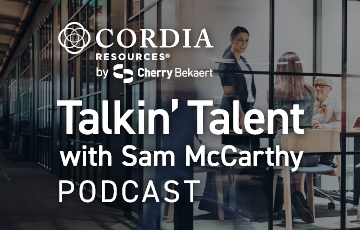In today’s competitive job market, artificial intelligence (AI) is no longer just a tool used by recruiters and large companies; it’s a powerful resource everyday job seekers can use to their advantage. Candidates now have access to a range of AI-powered tools that can help them strategically navigate the job search process, stand out to employers and take control of their career paths like never before.
We asked Cherry Bekaert Recruiting & Staffing Services Director Jordan Willetts and a Certified AI Recruiter through AIRS, what they have witnessed firsthand in the evolution of the candidate job market and how job seekers are adopting AI to their benefit. Here’s what they had to say:
Q: Is a Resume Still Important in the Age of AI?
A: Yes. A resume remains the most important and unique asset a job seeker has. A resume tells companies who you are, what skills you have, what you have achieved and when you achieved them, and why you are a good fit for the role you are applying to. It’s the foundation that gets you in the door for your next prospective job.
Q: How Can AI Optimize Resumes?
A: Different AI-enhanced platforms can analyze job descriptions and help candidates tailor their resumes to match key requirements and keywords.
Recruiters are also using AI to identify these resumes and locate the keywords and skills needed for the role they are working to fill, so it only makes sense for candidates to do the same.
Q: What Makes AI Tools So Effective for Building Resumes?
A: Utilizing simple “prompts,” candidates can easily have the AI software change their resume on a moment’s notice. Something that historically has taken hours, days or even outsourced assistance to be done professionally can now be achieved in minutes.
This isn’t just about using software to make your resume “look better,” it’s about understanding how to make your resume tailored to fit a specific role so you stand out amongst the crowd of applicants. By understanding how AI systems and recruiters evaluate applications, candidates can tailor their resumes to be more keyword-rich and aligned with specific job postings, giving them a competitive edge.
Q: Can AI Assist Beyond Just Resumes?
A: Of course. Not only can AI assist with resume building, but it can also help you craft your “personal brand” and communicate that more effectively. Sites like LinkedIn, where you are essentially marketing yourself to the business world, also welcome the use of AI to heavily increase your professional visibility, surface relevant connections and create engagement content frequently.
Tools can suggest relevant connections, flag potential openings within a candidate’s existing network, and even draft posts and personalized outreach messages. These capabilities help candidates avoid the scattershot approach of mass applications, focusing instead on meaningful, targeted efforts that lead to higher response rates. By regularly engaging with content, adjusting settings and utilizing relevant keywords, candidates can increase their chances of being discovered by recruiters.
Q: Are AI Tools Useful Across Different Industries?
A: Absolutely. The great thing about these AI platforms is that they can be applied to any field, from accounting to human resources (HR) and information technology (IT), among others.
Q: How Do AI-Powered Job Search Platforms Work?
A: AI-powered platforms like Indeed or ZipRecruiter utilize machine learning to suggest personalized job opportunities based on an individual’s experience, preferences and search behavior.
These recommendations become smarter the more you use them, allowing candidates to focus on high-fit roles instead of endlessly scrolling through irrelevant listings. Some even score your application strength based on your resume and suggest ways to improve it before you apply. The idea is that AI is making the job search less isolating and providing higher-quality jobs that candidates can apply for — a major win for candidates using AI.
Q: How Can AI Improve Communication During the Job Search?
A: While AI tools and platforms can drastically increase a candidate’s chances of being “seen,” it doesn’t end there. Candidates can now use writing assistants like Grammarly or ChatGPT to craft strong thank you emails, outreach messages, cover letters and really anything that involves communication.
We have all made spelling or grammar mistakes in emails and messages, but now with AI, this is largely eliminated if used correctly. AI can conduct email/message responses with zero spelling or grammatical errors and can even respond with the appropriate tone based on previous messages.
Knowing how to appropriately respond to a certain email or message can make or break a candidate landing a job or moving forward to next stages. That said, AI doesn’t replace human authenticity when it comes to communication, but it helps job seekers express themselves clearly and professionally. This is especially true for those in which writing doesn’t come naturally but whose experience and accolades still have a lot to offer.
Q: Can AI Help With Interview Preparation?
A: Certainly. Smart job seekers are using AI-powered platforms to track their applications, get real-time feedback on their communication style and even practice for interviews using chat-based AI bots, which can provide real-time feedback.
Different AI tools available to the public give candidates a chance to rehearse questions and receive instant feedback on pacing, filler words and message clarity. These AI platforms reduce anxiety, build confidence and enable candidates to fine-tune their delivery for when it’s time to interview.
Q: What Are the Risks of Using AI in the Job Search?
A: With all the benefits of AI that candidates can use to enhance their resumes, profiles and communications, it’s important to also note the potential downfalls and ethical concerns surrounding its use.
Candidates need to be cautious about over-automating their applications. Using the same AI-generated message or resume for every job is not recommended. Most seasoned recruiters can spot inauthentic or overly generic submissions or messages quickly, which will only hurt your chances of moving to the next stage.
Q: Can AI Lead to Misrepresentation?
A: It depends. It can be very easy to create a profile of misrepresentation if you are not careful.
If a candidate lands an interview based on an entirely AI-generated resume that has grossly overestimated their actual skills, it can quickly damage that candidate’s credibility with employers once they find out during the interview that it was all exaggerated.
Q: How Can Candidates Avoid Losing Authenticity?
A: Over-relying on AI to do everything for you will make it harder for an employer to know who you really are and determine if there is a proper technical fit, cultural fit, etc. The best results come when candidates use AI to assist their job search and self-marketing, rather than replacing their human authenticity.
Work Smarter, Not Harder
In a market where employers are using every tool available to find the right talent, it only makes sense that candidates do the same. So, looking ahead, candidates who adapt to these AI tools and understand how the hiring process is evolving will have a significant edge.
AI has leveled the playing field in many ways, and when used thoughtfully, it empowers job seekers to take control of their search, work smarter, and present their best selves with clarity and confidence. Knowing how to optimize your online presence, track your performance, and communicate effectively through every stage of the hiring funnel is quickly becoming essential in the job market.
Can We Help Place You?
Navigating the job market can be challenging, particularly with the evolving use of AI tools and an uncertain economic landscape. Fortunately, Cherry Bekaert's Recruiting & Staffing team works closely with both job seekers and employers to provide support in the accounting and finance, HR and IT sectors. Our extensive network enables job seekers to enhance their job search and present themselves effectively to potential employers.






